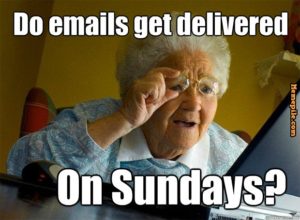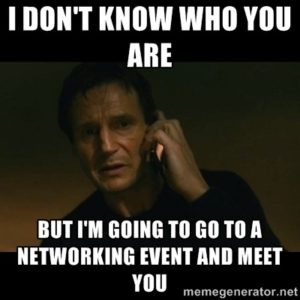I’ll be the first to admit it: I’m shy. I usually wait to raise my hand in class until I know everyone else has spoken at least once, I cower at the sight of a group presentation on any syllabus, and I’d rather write a twenty page research paper than have an oral final. As much as I know that professors are always happy to help when I have questions, I shirk office hours unless absolutely necessary (but I promise I’m working on this).
So, if there’s a phrase more terrifying to me than ‘group project,’ it’s ‘networking’.
 This summer, I interned with an environmental law firm in DC, and developed a warm relationship with my boss, Amanda. I was confident and comfortable discussing projects in her presence, but as soon as the conversation moved to the conference room with the other staff attorneys, I froze up. At the handful of different forums and conferences I attended where there were a plethora of accomplished people in the realm of environmental issues at my fingertips, I shrank back to the corners of the room and tried to make myself invisible.
This summer, I interned with an environmental law firm in DC, and developed a warm relationship with my boss, Amanda. I was confident and comfortable discussing projects in her presence, but as soon as the conversation moved to the conference room with the other staff attorneys, I froze up. At the handful of different forums and conferences I attended where there were a plethora of accomplished people in the realm of environmental issues at my fingertips, I shrank back to the corners of the room and tried to make myself invisible.
I could convince you (and often try to convince myself) that my hesitation is due to a lack of experience in the field, and the fact that I look more like a freshman in high school than a working professional. Those definitely are part of my timidness. But the truth is, I’m mostly terrified of actually approaching someone I have never met before.
Usually, I just end up having an anxious conversation with the voice in my head instead of with a real person: “Isn’t it weird to walk up to someone? What do I say? Should I ask them a question? What would I even ask? Maybe I could small talk? Won’t they just think I’m wasting their time?”
So after a summer of failed attempts, networking was at the top of my avoid-at-all-costs list. At least, that’s what I thought, until my mom told me I should consider going for an ‘informational interview’ with a few of the organizations I had applied to intern with over the summer, with two of her colleagues, and with the mom of one of my brother’s baseball teammates who works at NOAA (the National Oceanic and Atmospheric Association).
Despite relentless reminders of the great opportunity this would be for me to explore, hear others’ experiences, and garner an understanding for industries I may be interested in, I vehemently discredited the idea.
Why would anyone want take the time to sit down with a random college student they don’t know and who doesn’t know much about what she wants herself? Aren’t interviews supposed to be about actually getting a job, and not just talking about them?
After thinking about it for a while, (and of course, talking to my mom) it eventually set in that in the long run, it is worth it to get over my initial fear of approaching someone new for the opportunity to hear about and learn from others’ experiences. The introvert in me is still furiously dragging her feet, but I can’t sit in the corner of the conference room forever.
I am drafting an email now to get in touch with the woman who has worked with communications and environmental policy issues at NOAA, and just happened to be an English major – all avenues that I am looking into at the moment! I also registered to attend CP&R’s Speed Networking Workshop during Life After Scripps, so I will have faced the two things tied for number one on my avoid-at-all costs list.
Wish me luck – and keep your fingers crossed that I won’t chicken out at the last minute. I will let you know how it goes!







 1. Ew, why?
1. Ew, why?